It was dark when a group of volunteers arrived at Bethlehem Farm, a Catholic community in the hills of West Virginia.
As their minivans pulled into the gravel parking lot outside the farm’s main house earlier this fall, the 10 students from the University of Notre Dame were met by the farm’s full-time caretakers, who extended the customary Bethlehem Farm greeting: a “welcome home” hug.

“Those were the hardest hugs I’ve ever had in my life,” said Matthew Dunne, the only freshman in the group. “My initial reaction was, ‘What have I gotten myself into?’”
Mark Van Kirk, a junior studying computer science, was also startled.
“I felt like I was being treated like a close friend,” he said. “I don’t normally experience that with strangers.”
Eric Fitts, Bethlehem Farm’s director, said that surprising hospitality is exactly why hugs have become such a part of the central Appalachia farm’s culture.
In what ways could you offer “surprising hospitality” to your neighbors? What gesture fits the culture of your organization?
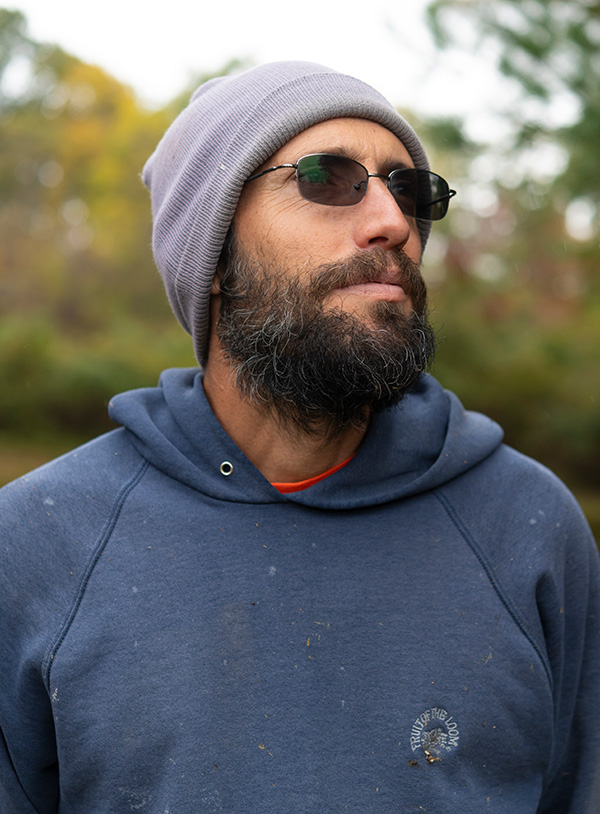
“We do that as a symbol of Christ in each person. What would we do if Jesus showed up on the property today?” he said. “It’s also a way of making ourselves vulnerable. When you open your arms, they’re not stiff out in front of you.”
Located in rural Summers County, Bethlehem Farm describes itself as an intentional Christian community based on “the Gospel cornerstones of service, simplicity, prayer, and community.” A group of caretakers lives and works together year-round, growing a lot of their own food, conserving as much water and electricity as possible, dressing modestly and largely eschewing technology.
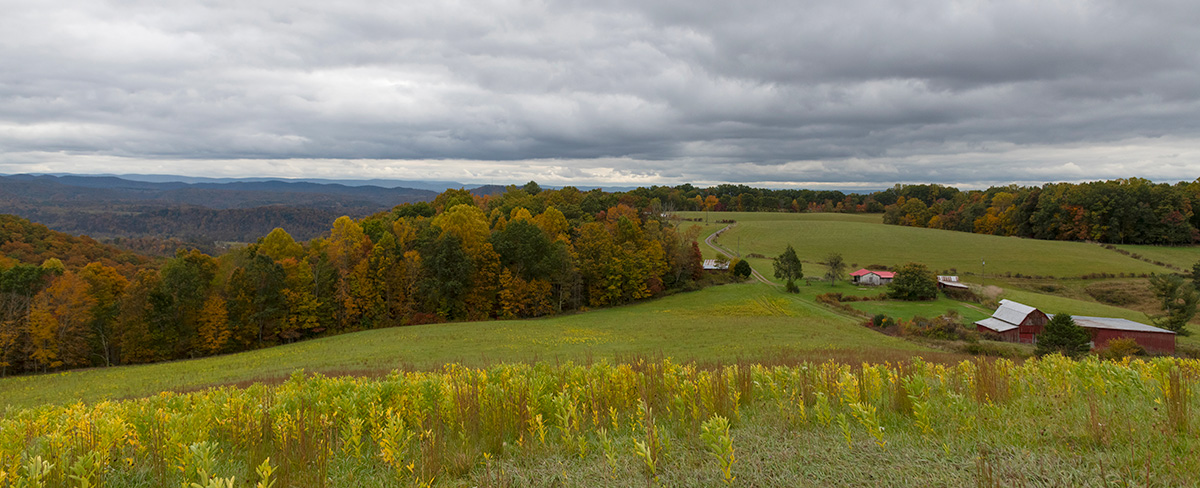
‘Simplicity is countercultural’
The farm welcomes hundreds of volunteers each year for weeklong retreats, where visitors work alongside the caretakers and mirror their way of life. Fitts said the farm’s model of hosting volunteers is in part for practical reasons — it brings in more hands to accomplish the work. But it also allows those volunteers to see mindful, intentional living with their own eyes.
“Whether it’s community living or the idea that simplicity is countercultural — it’s not the way, but it’s a possibility,” he said.
The Notre Dame students were on a midterm break, and all were enrolled in the school’s Appalachia Seminar. On their first morning, Fitts gave them a grand tour of the property. The land once belonged to the Kirwan family, who ran a Catholic Worker farm on the site from 1983 until 2004. The Bethlehem Farm organization formed there in 2005, although the land was then owned by the Diocese of Wheeling-Charleston.
What would simplicity — or a more simple life — look like in your context?
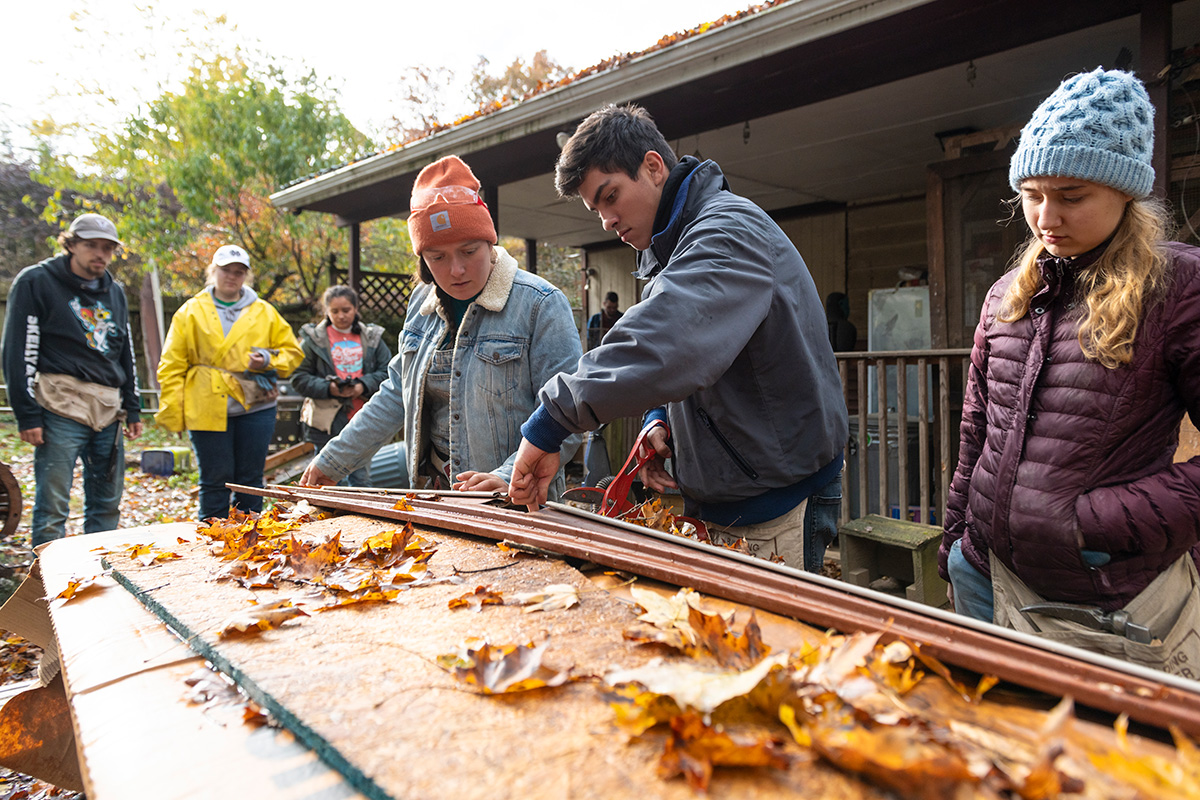
Fitts, a Wisconsin native, discovered Nazareth Farm in north central West Virginia while in college at Loyola University Chicago. Nazareth Farm is another Catholic community that emphasizes prayer, simplicity, community and service and offers service retreats for groups around the country. He fell in love with the way of life there and continued to organize trips to Nazareth Farm after going to work for Wheeling Jesuit University. During one such trip, the idea for Bethlehem Farm was born.
Fitts and others realized there were far more groups on the waiting list for Nazareth Farm than the organization could host. In addition, they wanted a farm that emphasized sustainable practices, which was not a focus of Nazareth Farm at the time. And they believed West Virginia needed more intentional communities.
“There was a neighbor who kept saying, ‘There needs to be more Nazareth Farms,’” Fitts said.
The diocese turned over the property to Bethlehem Farm in 2019.
The farm covers 91 acres, but only a small part is developed. Just below the house is a large pasture, where five donkeys take care of the grass. There are beehives that Fitts’ wife, Colleen, tends. The farm cemetery sits on a hill just above the pasture.
A little way off is the chicken house with its 45 unusually aggressive hens. There are high tunnels (also known as hoop houses), greenhouses, and garden plots of herbs, sweet potatoes, peppers, tomatoes, onions, and just about everything else that will grow in this climate.
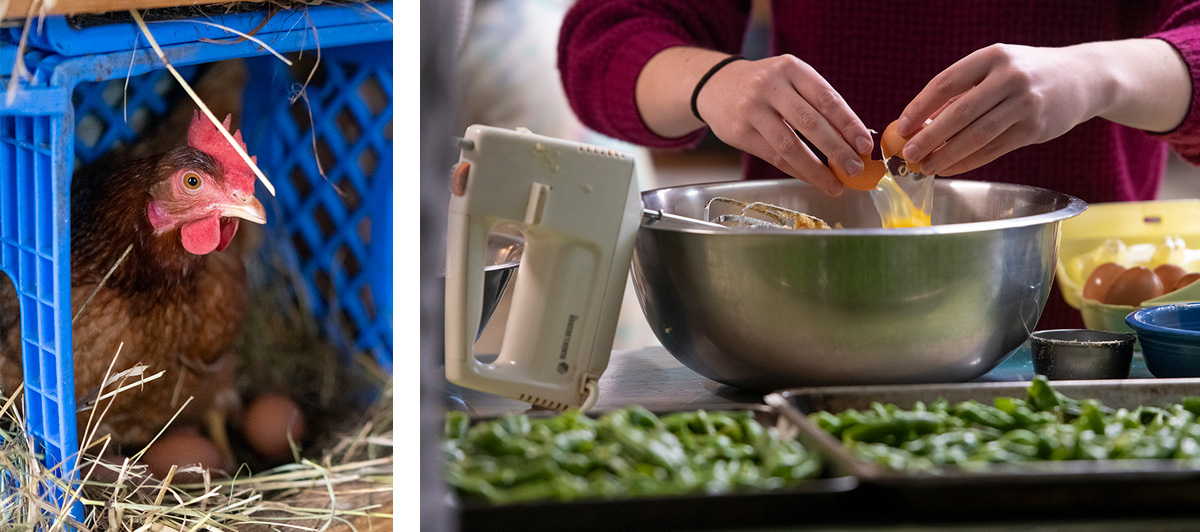
The two residences on the property — one for caretakers, the other for retreat guests — are as eco-friendly as possible. There are solar panels on the roofs. The large, homey cabins are heated by wood-burning stoves, and the plumbing is connected to a rainwater containment system with a capacity of nearly 50,000 gallons. But caretakers still limit themselves to two showers a week, and guests are invited to do the same. There are signs in the bathroom advising guests to flush toilets only when necessary.
In the kitchen, food scraps get composted into fertilizer. There’s not a disposable plate or cup in sight. When guests arrive, they choose coffee mugs and label them with masking tape — to use for the remainder of their stay. Although breakfasts and dinners are made fresh every day, lunches on the farm are a smorgasbord of leftovers.
“I told my dad these people would probably survive the longest in a zombie apocalypse,” Dunne, the freshman, said. “They would survive and be happy.”
Fitts said it’s all just part of the community’s attempt to live out the Gospels.
“When we say we’re living the gospel, I guess the question is — ‘How?’ I think in our culture right now, the default is you’re going to be living destructively: toward the environment, toward yourself, toward other people,” he said. “We’re looking to live creatively.”
Home repair and evening prayer
During their time on the farm, the students split into three work groups. Each day, two groups would work on construction projects with the farm’s Repairing Homes, Renewing Communities program, which provides free labor for home construction projects and allows clients to pay for materials with no-interest loans. The remaining group would serve as that day’s “home crew,” preparing meals, cleaning the residence and planning evening prayer.
What actions could you or your organization take to “live creatively”?
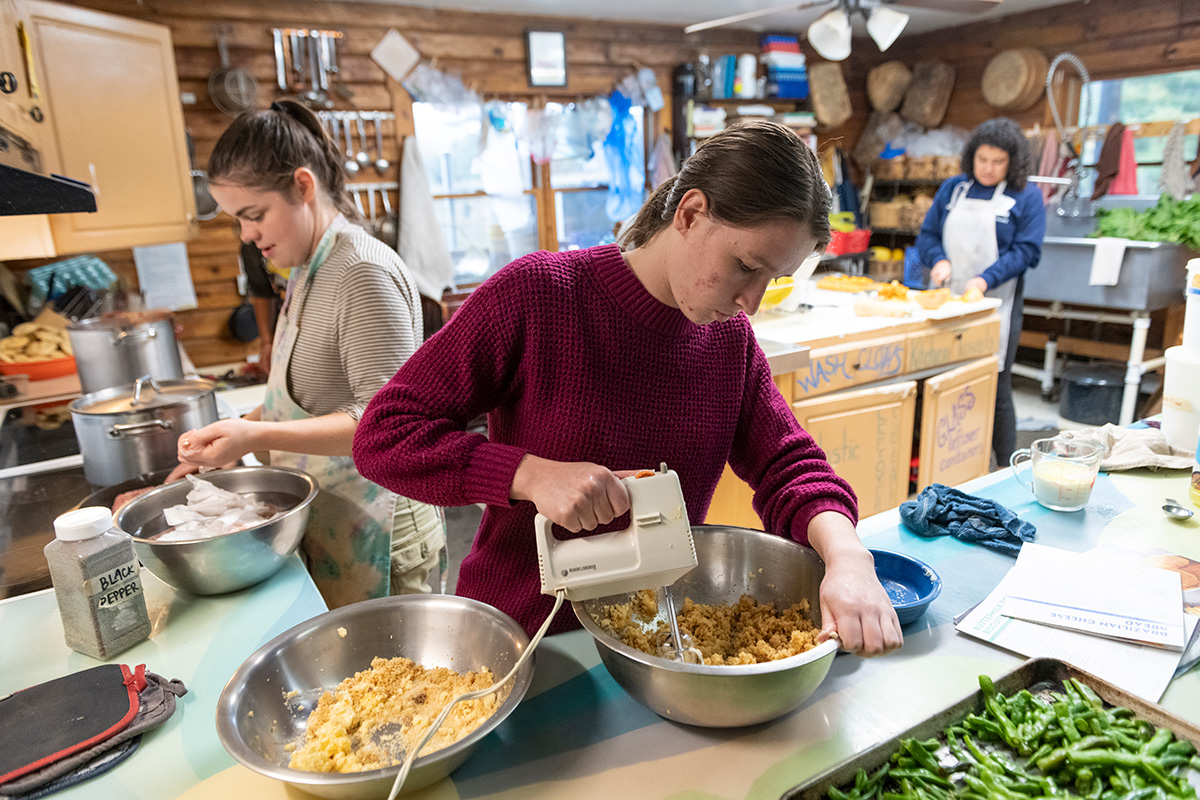
Two projects were underway when the college students visited. At one site, crews repaired a leaky roof by covering it with a new one made of metal. At the other, they measured, cut and installed new vinyl siding on a home.
Bethlehem Farm has other initiatives that go hand in glove with their home repair program. Its Sustainable Upgrade Fund allows families to use more durable, nontoxic and environmentally friendly materials in home projects for no additional cost. Its weatherization program helps homeowners insulate their homes to save on heating and cooling costs. And its renewable energy program gives low-income families 0% financing on solar panels. Volunteers help with all those projects except the installation of solar panels, which is done by professional contractors.
During groups’ first day at the farm, though, no one heads out to a work site. That day is spent doing some chores around the property and learning about the farm — and, more importantly, learning about Bethlehem Farm’s philosophy of service.
“So that we understand we’re not here to reach down a hand and lift up the ‘lowly poor,’” Fitts said.
While there was a renewed interest in helping poor Appalachians during the War on Poverty of the 1960s and 1970s, that assistance came with exploitation, Fitts said. The people of the region were often portrayed as uneducated, helpless and dirty, in need of outsiders to come and fix their issues. Bethlehem Farm is cautious not to perpetuate those stereotypes.
“We are coming with our poverty — the spiritual neglect in much of our culture, the poverty of ‘I’ve never pushed a wheelbarrow.’ And we come with our wealth, our strength, whatever it is we’re giving,” he said.
He emphasizes to students that the people Bethlehem Farm serves have their own poverty and challenges but also their own wealth — life experience, depth of faith, technical know-how, knowledge of local traditions.
That’s why Bethlehem Farm prefers not to use the term “clients” for the people it helps but rather “homeowners,” “partner families” or, even better, “neighbors.”
“Neighbors help neighbors. That’s a really strong trait of West Virginia,” Fitts said. “We just happen to be the neighbor who has 20 college kids come and visit.”
Are there nonmonetary ways for you to assess your community’s poverty and wealth? Your organization’s?

‘Small things’
Maria Vaquero, a junior education major, thought she would enjoy construction projects the most but wound up preferring her day on home crew duty. She packed lunches for the other crews and baked a cake for another student’s birthday.
“I’m a baker. I love to bake,” Vaquero said. “It’s a way of loving people.”
Vaquero still thinks about a quote — often attributed to Dorothy Day — that Bethlehem Farm house manager Molly Sutter lettered above the kitchen cabinets: “Everyone wants a revolution, but no one wants to do the dishes.”
“I think it talks about their simple way of lifestyle,” Vaquero said. “They might get criticism of how much of an impact they’re having — ‘What difference does it make?’ But it’s in the small things.”
That focus on “small things” comes through in Bethlehem Farm’s emphasis on prayer, which begins each day for the group.
“It wasn’t 30 hours of prayer. It was two minutes. And then it changed your perspective on the work you’re doing,” Vaquero said.
“We were on God’s time — that’s what they would tell us,” Dunne said. “We would start prayer while it was dark, and by the end of prayer, it was light. You could really feel time passing.”
The group prayed again before breakfast. They prayed before leaving the farm to head out to work sites and again when they arrived at the work sites. They prayed before lunch, before dinner and before bed.
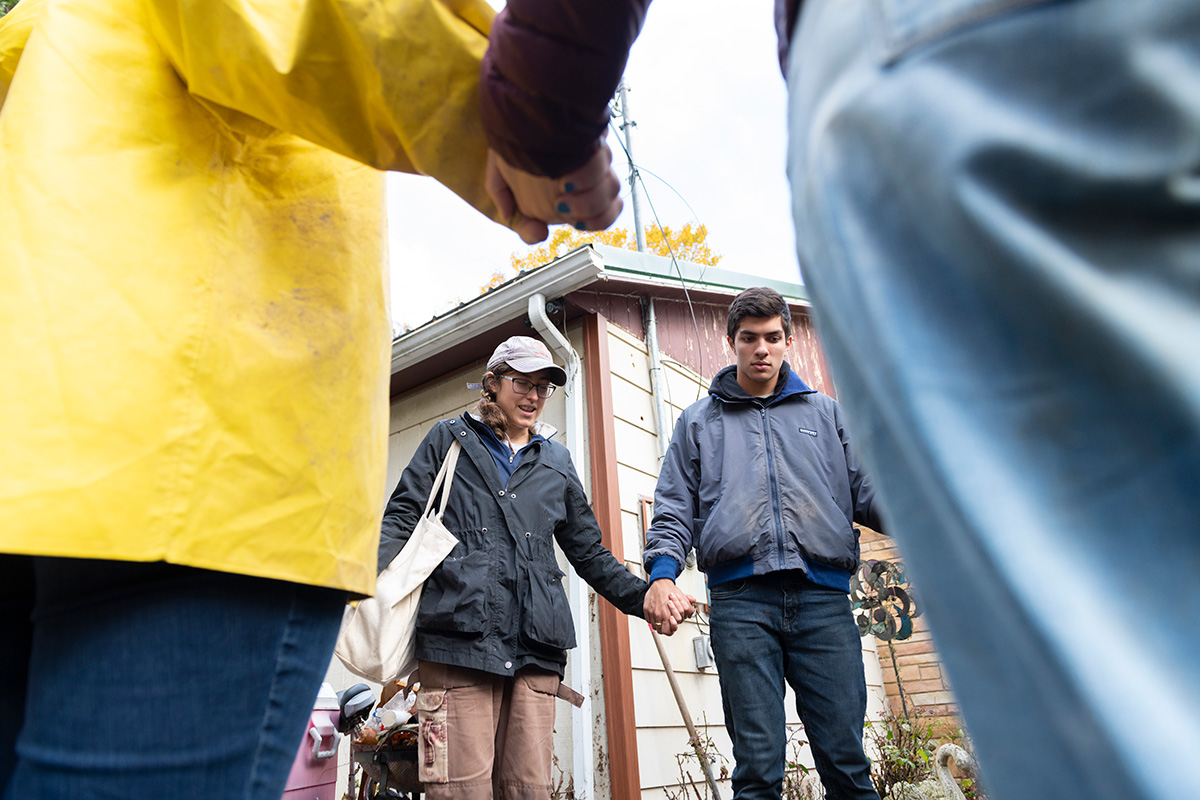
For junior Van Kirk, the emphasis on prayer helped him stay focused on the reason they were there.
“It made our work feel like it wasn’t just work. It felt like it was very purposeful,” he said.
The farm has another way of fostering connection among volunteers — by asking them to fast from technology during their stay. Cell service isn’t great on the property anyway, but the students said they initially found the lack of screens a little difficult.
“I remember, at the beginning of the week, every time I would stand up from a couch I would pat myself and check if I had my phone,” Vaquero said.
But as the week went on, she noticed that the lack of phones changed how she and her peers interacted.
“It forced us to be with one another,” she said. “I’ve realized after the trip, in group settings where there’s nothing to do, people look at their phones and scroll mindlessly. But [at the farm] there was no moment of silence unless it was prayer time. Someone would find something to talk about.”
What “small things” matter in your organization?

Since returning to campus, Dunne has been thinking about how limiting screen time can make him more present with those around him — the way the people at Bethlehem Farm are, he said.
“They’re teaching us what it feels like to be part of a community,” Dunne said. “I could re-create that in my life.”
Gathered in a circle
Every Tuesday night, Bethlehem Farm hosts a community dinner. It’s open to anyone who wants to attend, but caretakers have a list of people they call each week to invite: neighbors they’ve helped in the past, members of the church they attend, other people from the community.
On the week that the Notre Dame students were there, about 40 people showed up. They filled every seat at the multiple dining tables, leaving a few guests to take a seat on couches and coffee tables.
The home crew worked on dinner all day, preparing sausage lasagna, butternut squash, garlic knots, gluten-free cheese rolls, Brussels sprouts, salad greens. One of the guests brought a Little Caesars Hot-N-Ready pizza, which the kids in attendance quickly devoured.
Would you consider fasting from cellphone use as a spiritual practice? What might be the obstacles and benefits?
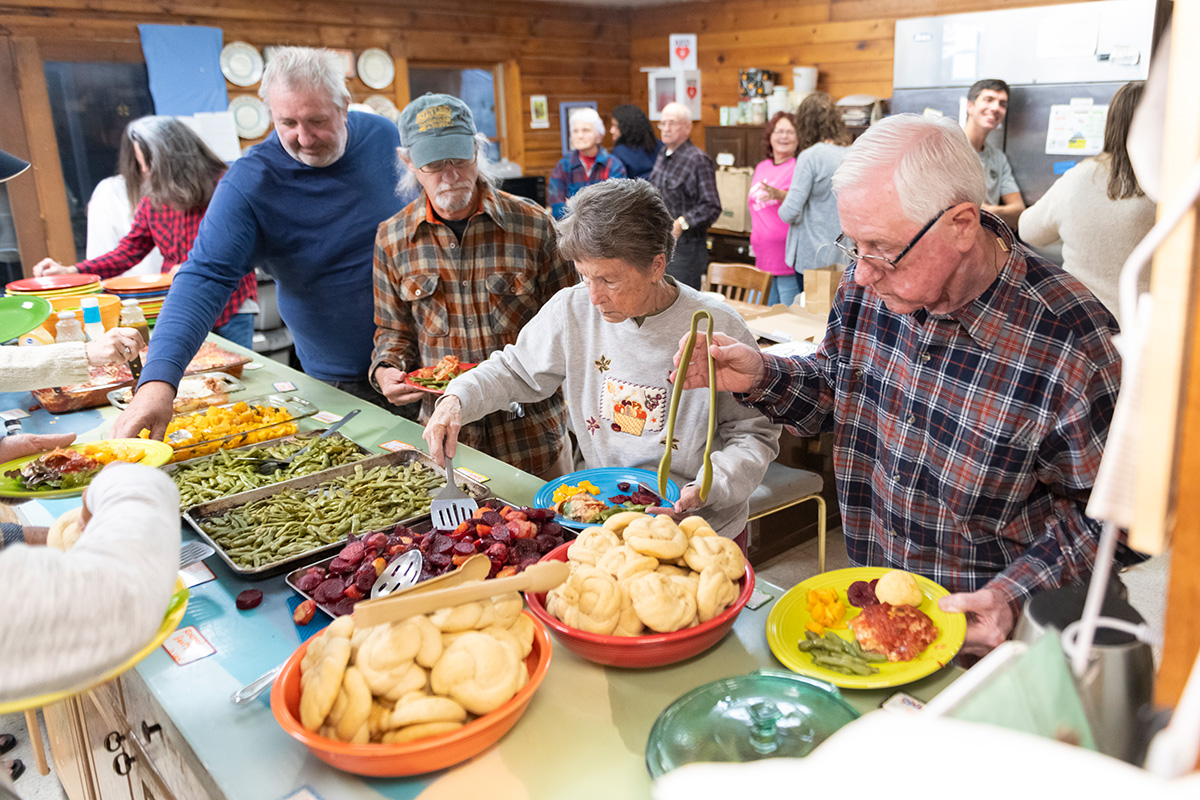
But before dinner was served, everyone gathered in a circle in the center of the room. One by one, they introduced themselves and talked about their connection with the farm.
Among those in the circle were Catherine Wheeler and her mother, Bobbie. They had been introduced to the farm through its home repair program — crews had fixed the gutters, porch steps and shower at Bobbie’s house. She now comes to the dinners almost every week and enjoys the opportunity to socialize with people from her community. Bobbie suffers from COPD and Alzheimer’s disease, and Wheeler, as her mother’s full-time caretaker, doesn’t get many opportunities to interact with other people. She said Bobbie enjoys the meals too.
“I can mention we’re going to dinner at the farm, and she’s ready to go,” Wheeler said.
Near the end of the circle stood Maury Johnson of Summers County Residents Against the Pipeline — SCRAP, for short. He was making his first visit to the community dinner, but SCRAP has been working with Bethlehem Farm for months to protest the Mountain Valley Pipeline project. The natural gas pipeline, which will span more than 300 miles from northwestern West Virginia to southern Virginia, doesn’t directly affect Bethlehem Farm but will run through neighboring properties. And the project’s largest stream crossing is just down the road.
“Bethlehem Farm has been protectors of this river for a long time,” Johnson said. “They’re not boastful. They don’t say, ‘Look at me.’ They just do it.
“The world needs more Bethlehem Farm,” he said.
Around the circle, heads nodded in agreement. Then all present bowed their heads and prayed.
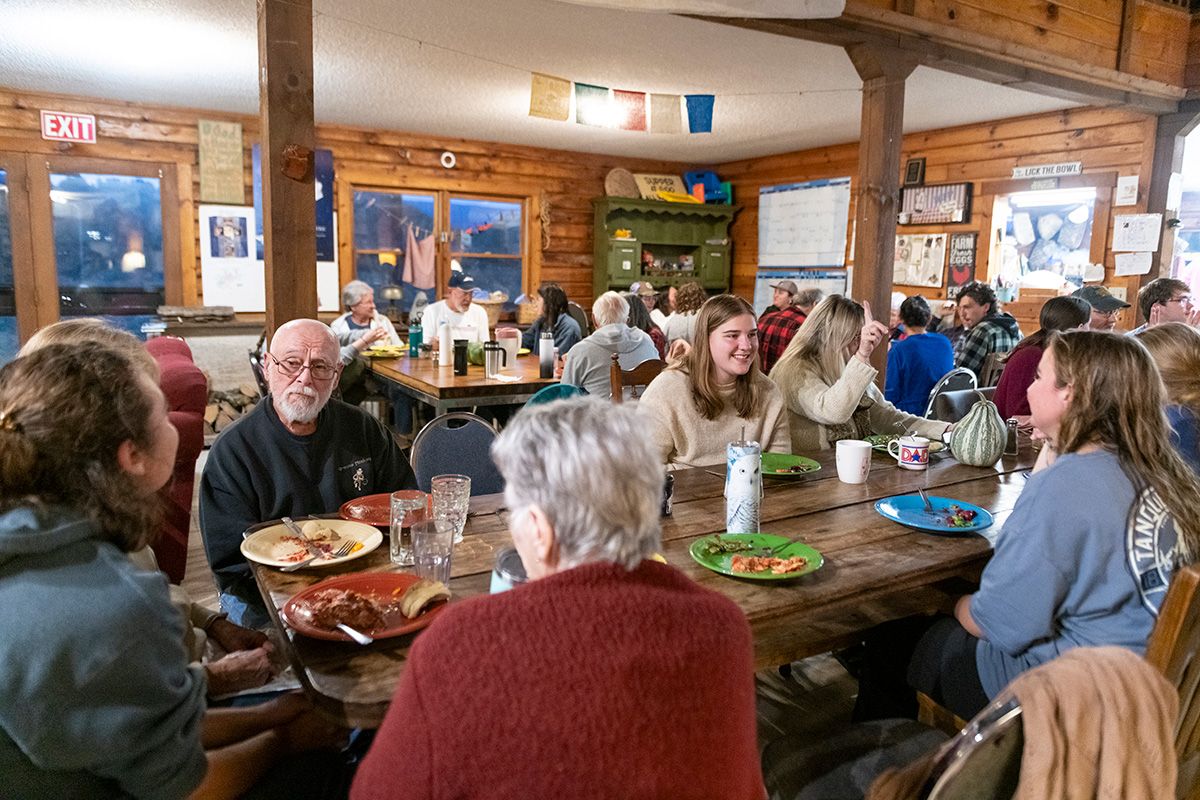
Questions to consider
- In what ways could you offer “surprising hospitality” to your neighbors? What gesture fits the culture of your organization?
- What would simplicity — or a more simple life — look like in your context?
- Bethlehem Farm takes a specific approach to living out the Gospels. What other actions could you or your organization take to “live creatively”?
- Are there nonmonetary ways for you to assess your community’s poverty and wealth? Your organization’s?
- What “small things” matter in your organization?
- Would you consider fasting from cellphone use as a spiritual practice? What might be the obstacles and benefits of such a practice?
